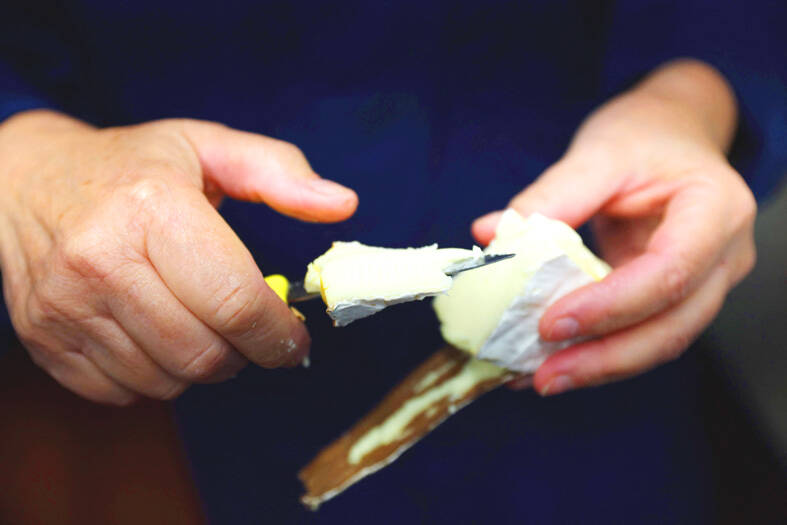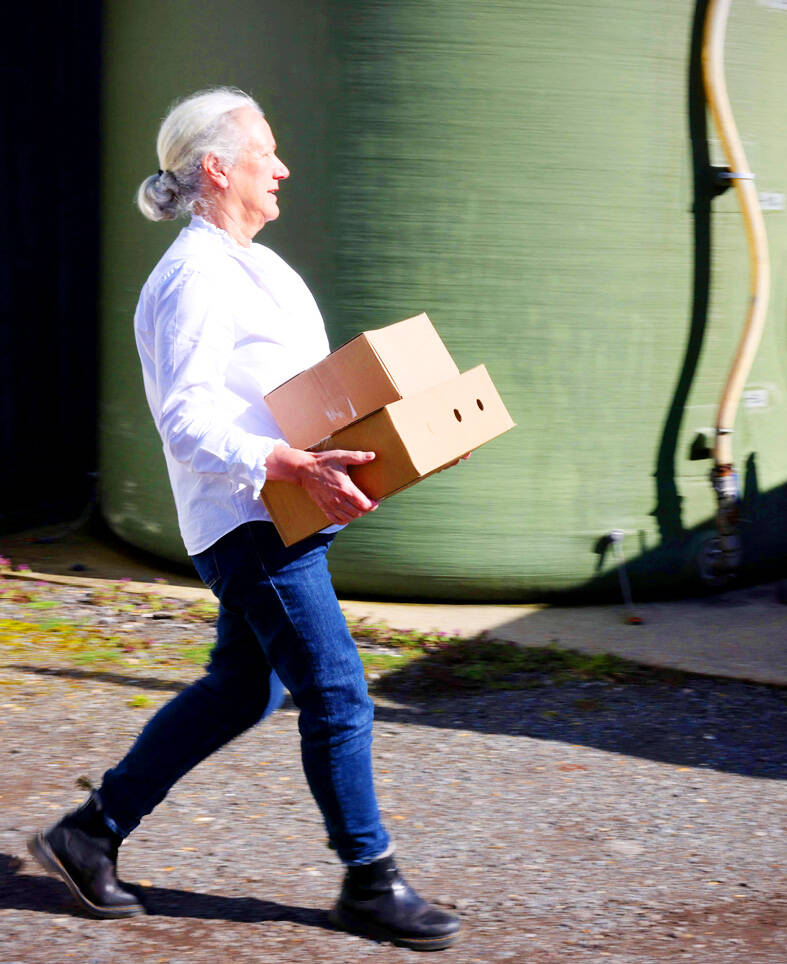“I never thought it would be as big as this,” said Stacey Hedges of her booming French-style cheese business, as another truck-load left the green Hampshire countryside for some of Britain’s finest restaurants.
Former chef Hedges founded the Hampshire Cheese Co in 2005 and started producing Tunworth, a handmade Camembert-style cheese.
She is one of dozens of entrepreneurs who have gone into cheese-making across England, Scotland and Wales. As a result, the country now produces a wider variety of soft cheeses alongside traditional British hard cheeses such Cheddar.

Photo: AFP
France, the “country of a thousand cheeses,” is often a source of inspiration.
Nine employees work in Hedges’ creamery near Basingstoke in England’s southern Hampshire region, making about 7,000 cheeses a week, and up to 12,000 during the Christmas season.
Her Web site even carries a quote from French chef Raymond Blanc, who describes Tunworth as “the best Camembert in the world.”

Photo: AFP
While a provocative remark for Blanc’s countrymen, it is undeniable that the cheese has made its mark on menus and shelves across the UK.
In the Basingstoke factory, there is not a machine in sight. Everything is done by hand, from the handling of the milk — delivered by a neighboring farm — to the packaging in a round wooden box imported from France.
As well as Tunworth, the Hampshire Cheese Co also makes the softer Winslade, which Hedges likens to Vacherin.
The 61-year-old received help from French experts, who advised her on the manufacturing process.
“In this country we have Stilton and Cheddar, but we don’t have the knowledge for soft cheese,” Hedges said.
Her success has inspired other Britons.
“It’s a very exciting time to be in the industry,” said Bronwen Percival, technical manager at Neal’s Yard Dairy, which has four shops in London selling almost exclusively British cheese.
“There are new people coming out all the time with a real entrepreneurial spirit,” she said. “We sell mozzarella from Italy, but if somebody [British] arrives on the scene making a beautiful mozzarella, as good as the one we currently sell, we might decide to switch.”
This has already happened with homegrown varieties of Brie and Camembert, as the UK dairy industry continues to adapt from the shock of deregulation in the 1990s.
Prior to then, a state marketing board regulated the production and distribution of milk, setting a floor under prices for other diary products.
After the board was abolished and the price of milk plummeted, diary producers were under pressure to add value through other products.
They responded with soft cheeses, which proved a hit with consumers.
“The key thing is people want to know where the food they eat is from and support local producers,” said Tracey Colley from the Academy of Cheese, which runs tasting courses and events such as the British Cheese Weekend.
The COVID-19 pandemic has also helped.
“When people stayed at home, cheese became a treat for some,” she said.
Yet it is still a long way from mass consumption.
“Everyone has Cheddar in their fridge,” but other cheeses remain fairly niche, Colley said. “What we’re trying to change with the academy is to get people in the same mindset as in France: Eat cheese every day.”
Ironically, France is one of Neal’s Yard Dairy’s top foreign markets.
Hedges sells her Tunworth in Hong Kong, the US, Belgium, the Netherlands and elsewhere, but she draws the line at trying to break into the home of Camembert.
“Do you think the French would buy British Camembert?” she asked, jokingly.

MULTIFACETED: A task force has analyzed possible scenarios and created responses to assist domestic industries in dealing with US tariffs, the economics minister said The Executive Yuan is tomorrow to announce countermeasures to US President Donald Trump’s planned reciprocal tariffs, although the details of the plan would not be made public until Monday next week, Minister of Economic Affairs J.W. Kuo (郭智輝) said yesterday. The Cabinet established an economic and trade task force in November last year to deal with US trade and tariff related issues, Kuo told reporters outside the legislature in Taipei. The task force has been analyzing and evaluating all kinds of scenarios to identify suitable responses and determine how best to assist domestic industries in managing the effects of Trump’s tariffs, he

TIGHT-LIPPED: UMC said it had no merger plans at the moment, after Nikkei Asia reported that the firm and GlobalFoundries were considering restarting merger talks United Microelectronics Corp (UMC, 聯電), the world’s No. 4 contract chipmaker, yesterday launched a new US$5 billion 12-inch chip factory in Singapore as part of its latest effort to diversify its manufacturing footprint amid growing geopolitical risks. The new factory, adjacent to UMC’s existing Singapore fab in the Pasir Res Wafer Fab Park, is scheduled to enter volume production next year, utilizing mature 22-nanometer and 28-nanometer process technologies, UMC said in a statement. The company plans to invest US$5 billion during the first phase of the new fab, which would have an installed capacity of 30,000 12-inch wafers per month, it said. The

Taiwan’s official purchasing managers’ index (PMI) last month rose 0.2 percentage points to 54.2, in a second consecutive month of expansion, thanks to front-loading demand intended to avoid potential US tariff hikes, the Chung-Hua Institution for Economic Research (CIER, 中華經濟研究院) said yesterday. While short-term demand appeared robust, uncertainties rose due to US President Donald Trump’s unpredictable trade policy, CIER president Lien Hsien-ming (連賢明) told a news conference in Taipei. Taiwan’s economy this year would be characterized by high-level fluctuations and the volatility would be wilder than most expect, Lien said Demand for electronics, particularly semiconductors, continues to benefit from US technology giants’ effort

‘SWASTICAR’: Tesla CEO Elon Musk’s close association with Donald Trump has prompted opponents to brand him a ‘Nazi’ and resulted in a dramatic drop in sales Demonstrators descended on Tesla Inc dealerships across the US, and in Europe and Canada on Saturday to protest company chief Elon Musk, who has amassed extraordinary power as a top adviser to US President Donald Trump. Waving signs with messages such as “Musk is stealing our money” and “Reclaim our country,” the protests largely took place peacefully following fiery episodes of vandalism on Tesla vehicles, dealerships and other facilities in recent weeks that US officials have denounced as terrorism. Hundreds rallied on Saturday outside the Tesla dealership in Manhattan. Some blasted Musk, the world’s richest man, while others demanded the shuttering of his